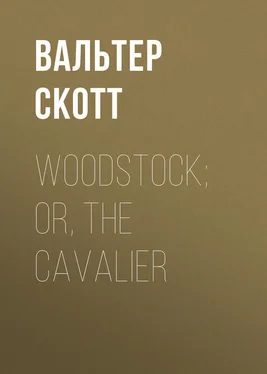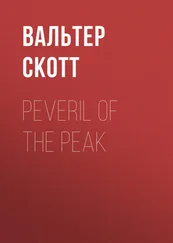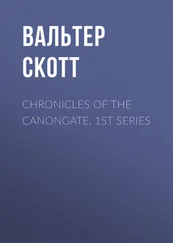Вальтер Скотт - Woodstock; or, the Cavalier
Здесь есть возможность читать онлайн «Вальтер Скотт - Woodstock; or, the Cavalier» — ознакомительный отрывок электронной книги совершенно бесплатно, а после прочтения отрывка купить полную версию. В некоторых случаях можно слушать аудио, скачать через торрент в формате fb2 и присутствует краткое содержание. Жанр: foreign_antique, foreign_prose, Альтернативная история, на английском языке. Описание произведения, (предисловие) а так же отзывы посетителей доступны на портале библиотеки ЛибКат.
- Название:Woodstock; or, the Cavalier
- Автор:
- Жанр:
- Год:неизвестен
- ISBN:нет данных
- Рейтинг книги:5 / 5. Голосов: 1
-
Избранное:Добавить в избранное
- Отзывы:
-
Ваша оценка:
- 100
- 1
- 2
- 3
- 4
- 5
Woodstock; or, the Cavalier: краткое содержание, описание и аннотация
Предлагаем к чтению аннотацию, описание, краткое содержание или предисловие (зависит от того, что написал сам автор книги «Woodstock; or, the Cavalier»). Если вы не нашли необходимую информацию о книге — напишите в комментариях, мы постараемся отыскать её.
Woodstock; or, the Cavalier — читать онлайн ознакомительный отрывок
Ниже представлен текст книги, разбитый по страницам. Система сохранения места последней прочитанной страницы, позволяет с удобством читать онлайн бесплатно книгу «Woodstock; or, the Cavalier», без необходимости каждый раз заново искать на чём Вы остановились. Поставьте закладку, и сможете в любой момент перейти на страницу, на которой закончили чтение.
Интервал:
Закладка:
The varied and multiplied fronts of this irregular building were, as Dr. Rochecliffe was wont to say, an absolute banquet to the architectural antiquary, as they certainly contained specimens of every style which existed, from the pure Norman of Henry of Anjou, down to the composite, half Gothic half classical architecture of Elizabeth and her successor. Accordingly, the rector was himself as much enamoured of Woodstock as ever was Henry of Fair Rosamond; and as his intimacy with Sir Henry Lee permitted him entrance at all times to the Royal Lodge, he used to spend whole days in wandering about the antique apartments, examining, measuring, studying, and finding out excellent reasons for architectural peculiarities, which probably only owed their existence to the freakish fancy of a Gothic artist. But the old antiquary had been expelled from his living by the intolerance and troubles of the times, and his successor, Nehemiah Holdenough, would have considered an elaborate investigation of the profane sculpture and architecture of blinded and blood-thirsty Papists, together with the history of the dissolute amours of old Norman monarchs, as little better than a bowing down before the calves of Bethel, and a drinking of the cup of abominations. – We return to the course of our story.
"There is," said the Independent Tomkins, after he had carefully perused the front of the building, "many a rare monument of olden wickedness about this miscalled Royal Lodge; verily, I shall rejoice much to see the same destroyed, yea, burned to ashes, and the ashes thrown into the brook Kedron, or any other brook, that the land may be cleansed from the memory thereof, neither remember the iniquity with which their fathers have sinned."
The keeper heard him with secret indignation, and began to consider with himself, whether, as they stood but one to one, and without chance of speedy interference, he was not called upon, by his official duty, to castigate the rebel who used language so defamatory. But he fortunately recollected, that the strife must be a doubtful one – that the advantage of arms was against him – and that, in especial, even if he should succeed in the combat, it would be at the risk of severe retaliation. It must be owned, too, that there was something about the Independent so dark and mysterious, so grim and grave, that the more open spirit of the keeper felt oppressed, and, if not overawed, at least kept in doubt concerning him; and he thought it wisest, as well as safest, for his master and himself, to avoid all subjects of dispute, and know better with whom he was dealing, before he made either friend or enemy of him.
The great gate of the Lodge was strongly bolted, but the wicket opened on Joceline's raising the latch. There was a short passage of ten feet, which had been formerly closed by a portcullis at the inner end, while three loopholes opened on either side, through which any daring intruder might be annoyed, who, having surprised the first gate, must be thus exposed to a severe fire before he could force the second. But the machinery of the portcullis was damaged, and it now remained a fixture, brandishing its jaw, well furnished with iron fangs, but incapable of dropping it across the path of invasion.
The way, therefore, lay open to the great hall or outer vestibule of the Lodge. One end of this long and dusky apartment was entirely occupied by a gallery, which had in ancient times served to accommodate the musicians and minstrels. There was a clumsy staircase at either side of it, composed of entire logs of a foot square; and in each angle of the ascent was placed, by way of sentinel, the figure of a Norman foot-soldier, having an open casque on his head, which displayed features as stern as the painter's genius could devise. Their arms were buff-jackets, or shirts of mail, round bucklers, with spikes in the centre, and buskins which adorned and defended the feet and ankles, but left the knees bare. These wooden warders held great swords, or maces, in their hands, like military guards on duty. Many an empty hook and brace, along the walls of the gloomy apartment, marked the spots from which arms, long preserved as trophies, had been, in the pressure of the wars, once more taken down, to do service in the field, like veterans whom extremity of danger recalls to battle. On other rusty fastenings were still displayed the hunting trophies of the monarchs to whom the Lodge belonged, and of the silvan knights to whose care it had been from time to time confided.
At the nether end of the hall, a huge, heavy, stone-wrought chimney-piece projected itself ten feet from the wall, adorned with many a cipher, and many a scutcheon of the Royal House of England. In its present state, it yawned like the arched mouth of a funeral vault, or perhaps might be compared to the crater of an extinguished volcano. But the sable complexion of the massive stone-work, and all around it, showed that the time had been when it sent its huge fires blazing up the huge chimney, besides puffing many a volume of smoke over the heads of the jovial guests, whose royalty or nobility did not render them sensitive enough to quarrel with such slight inconvenience. On these occasions, it was the tradition of the house, that two cart-loads of wood was the regular allowance for the fire between noon and curfew, and the andirons, or dogs, as they were termed, constructed for retaining the blazing firewood on the hearth, were wrought in the shape of lions of such gigantic size as might well warrant the legend. There were long seats of stone within the chimney, where, in despite of the tremendous heat, monarchs were sometimes said to have taken their station, and amused themselves with broiling the umbles , or dowsels , of the deer, upon the glowing embers, with their own royal hands, when happy the courtier who was invited to taste the royal cookery. Tradition was here also ready with her record, to show what merry gibes, such as might be exchanged between prince and peer, had flown about at the jolly banquet which followed the Michaelmas hunt. She could tell, too, exactly, where King Stephen sat when he darned his own princely hose, and knew most of the odd tricks he had put upon little Winkin, the tailor of Woodstock.
Most of this rude revelry belonged to the Plantagenet times. When the house of Tudor ascended to the throne, they were more chary of their royal presence, and feasted in halls and chambers far within, abandoning the outmost hall to the yeomen of the guard, who mounted their watch there, and passed away the night with wassail and mirth, exchanged sometimes for frightful tales of apparitions and sorceries, which made some of those grow pale, in whose ears the trumpet of a French foeman would have sounded as jollily as a summons to the woodland chase.
Joceline pointed out the peculiarities of the place to his gloomy companion more briefly than we have detailed them to the reader. The Independent seemed to listen with some interest at first, but, flinging it suddenly aside, he said in a solemn tone, "Perish, Babylon, as thy master Nebuchadnezzar hath perished! He is a wanderer, and thou shalt be a waste place – yea, and a wilderness – yea, a desert of salt, in which there shall be thirst and famine."
"There is like to be enough of both to-night," said Joceline, "unless the good knight's larder be somewhat fuller than it is wont."
"We must care for the creature-comforts," said the Independent, "but in due season, when our duties are done. Whither lead these entrances?"
"That to the right," replied the keeper, "leads to what are called, the state-apartments, not used since the year sixteen hundred and thirty-nine, when his blessed Majesty" —
"How, sir!" interrupted the Independent, in a voice of thunder, "dost thou speak of Charles Stewart as blessing, or blessed? – beware the proclamation to that effect."
Читать дальшеИнтервал:
Закладка:
Похожие книги на «Woodstock; or, the Cavalier»
Представляем Вашему вниманию похожие книги на «Woodstock; or, the Cavalier» списком для выбора. Мы отобрали схожую по названию и смыслу литературу в надежде предоставить читателям больше вариантов отыскать новые, интересные, ещё непрочитанные произведения.
Обсуждение, отзывы о книге «Woodstock; or, the Cavalier» и просто собственные мнения читателей. Оставьте ваши комментарии, напишите, что Вы думаете о произведении, его смысле или главных героях. Укажите что конкретно понравилось, а что нет, и почему Вы так считаете.












